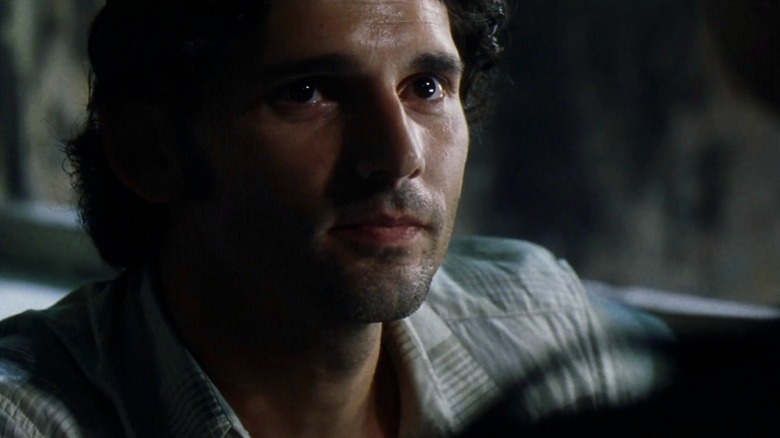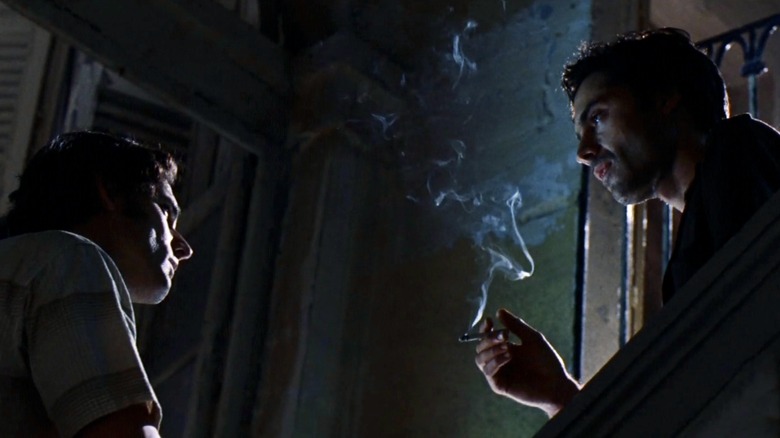Steven Spielberg Knew He Was Walking Into A 'Minefield' By Directing Munich
Steven Spielberg's most highly acclaimed film, "Schindler's List," pivoted away from the summer blockbusters for which the director was known and into more serious territory, dealing head-on with the Holocaust. Though it won the Academy Award for Best Picture and the American Film Institute recognized it with a Top 10 spot on its list of the greatest movies of all time, Spielberg's dramatization of World War II genocide still faced criticism from some quarters, including fellow filmmaker Claude Lanzmann, known for his own sober, BFI-recognized Holocaust documentary, "Shoah." Spielberg, who comes from an Orthodox Jewish background, was therefore no stranger to hearing from detractors when he took on another project dealing with Jewish history in his 2005 film "Munich."
Based on the book "Vengeance" by George Jonas, "Munich" takes its title from the 1972 massacre that occurred in Munich, Germany, while it served as the site of the Summer Olympics. The film opens with a reenactment of real events, as armed members of the Palestinian terrorist organization Black September kidnap Israeli athletes from the Olympic Village in Munich. This leads to a hostage situation where all 11 athletes are killed, which, in turn, compels the Israeli intelligence agency Mossad to assemble a covert assassination team, led by Eric Bana's protagonist Avner Kaufman, to carry out Operation Wrath of God against members of Black September and the PLO (Palestine Liberation Organization).
Post-9/11 politics, the ongoing Israeli-Palestinian conflict, and questions of historical accuracy ensured that "Munich" would be controversial. In a 2005 interview, Spielberg told film critic Roger Ebert, "I knew the minefield was there. I wasn't naive in accepting this challenge. I knew I was going to be losing friends when I took on the subject. I am also making new friends."
'It puts a real burden on the audience'
At the heart of the "Munich" controversy was the film's tacit refusal to spoon-feed the audience answers to difficult questions. In one notable scene, Avner and a PLO member named Ali (Omar Metwally) take a cigarette break on a stairwell and have a frank discussion about the possible futility of fighting over holy land in the Middle East. Their dialogue is a true back-and-forth that gives equal weight in the scene to Ali's Palestinian perspective.
The assassination mission, meanwhile, takes its toll on Avner and the other members of his team, played by Daniel Craig, Ciarán Hinds, Mathieu Kassovitz, and Hanns Zischler. They begin to have doubts about it and the collateral damage it inflicts. As Ebert notes in his interview with Spielberg, critics saw the film as being alternatively anti-Israeli or anti-Palestinian and drawing a questionable "moral equivalency" between the two sides of the conflict. Spielberg continued:
"It would make people more comfortable if I made a film that said all targeted assassination is bad, or good, but the movie doesn't take either of those positions. It refuses to. Many of those pundits on the left and right would love the film to land somewhere definite. It puts a real burden on the audience to figure out for themselves how they feel about these issues. There are no easy answers to the most complex story of the last 50 years."
"Munich" was nominated for five Oscars, including Best Picture, Best Director, and Best Adapted Screenplay for Eric Roth and Tony Kushner. It did not win, but Spielberg and Kushner would reunite for "Lincoln" and "West Side Story," and their first collaboration on "Munich" remains a challenging film with continued relevance to real-world divisions in the Middle East and elsewhere globally.

